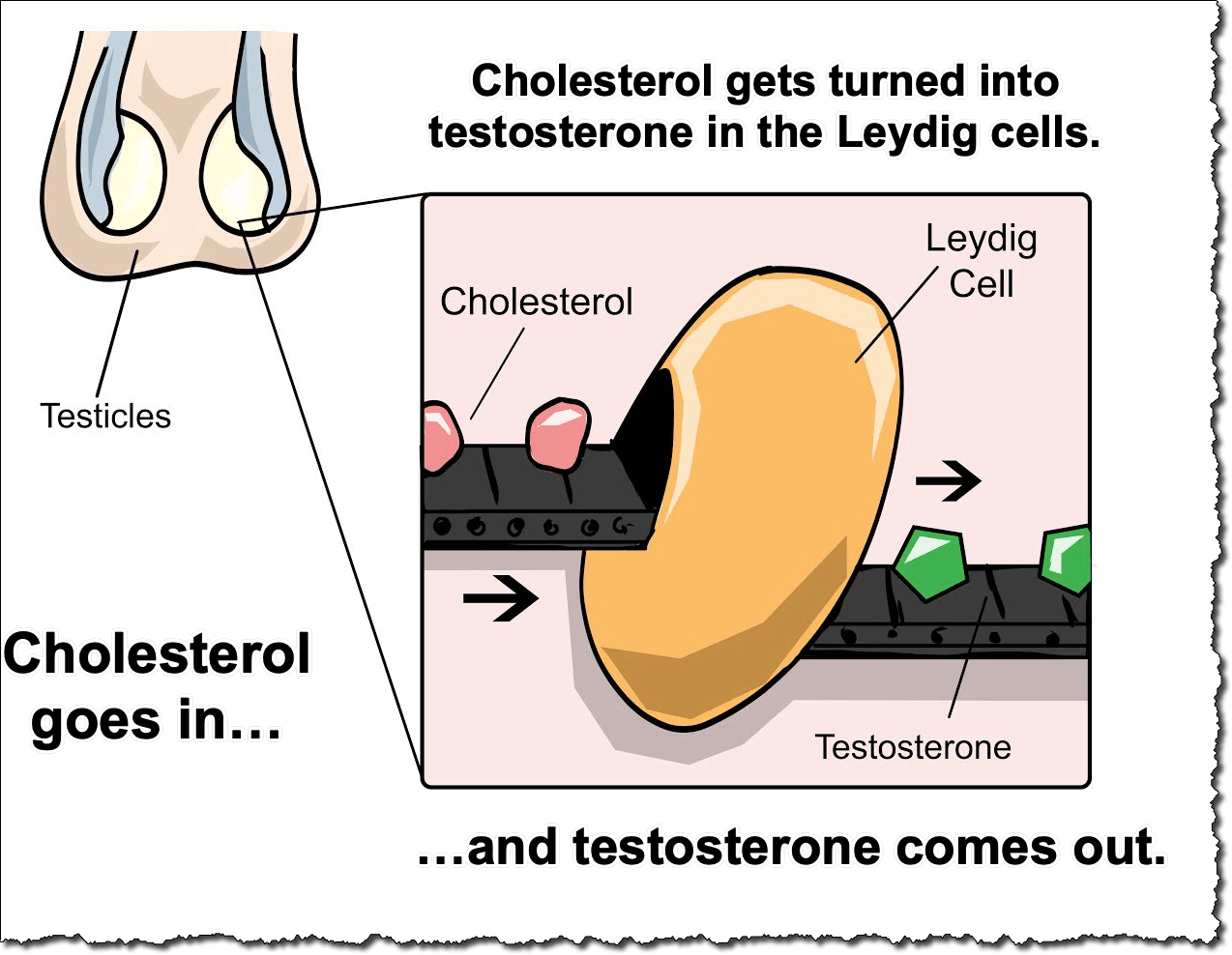
[cmamad id=”26973″ align=”center” tabid=”display-desktop” mobid=”display-desktop” stg=””]
Believe it or not, YES… And it’s 100% natural…
—-Important Message—-
Turn high cholesterol into high testosterone – here’s how
Holidays often result in our eating a lot more – and that often raises cholesterol.
Most men don’t know that this cholesterol can be turned into testosterone.
Here’s how.
Do you know about the factory process that goes on in the testicles?
Cholesterol goes in, and testosterone comes out.
It all happens in the Leydig cells in a man’s testicles, and it’s completely natural:

But sometimes, as a man gets older, this little factory process slows down or stops working…
And then your cholesterol goes up… And your testosterone goes down…
Doctors will tell you to take a statin… But this often makes testosterone LOWER.
Luckily, I’ve created my very own protocol… And it naturally restarts this factory process in the body…
Your high cholesterol gets turned into high testosterone – win-win!
———-
Turn holiday cholesterol into testosterone
Cholesterol tests have become pretty standard in medical work-ups.
If your levels are high, your doctor may recommend going on medications to lower your levels.
Lifestyle changes can also alter cholesterol levels…
And once those levels are elevated, you have a choice to make.
But does the time of the year affect cholesterol levels?
Research shows that cholesterol levels can be significantly higher in December and January.
If you have your levels tested during these months, you may wish to get retested later.
If you already have high levels and you are concerned about that, you may need to watch your lifestyle over the holidays.

These scientists did human research at the Copenhagen University Hospital in Denmark. They published their results in the journal Atherosclerosis.
The holiday season can be a period of excess from many people.
And all that fatty food and alcohol could increase cholesterol levels.
The researchers were curious to find out if this was the case.
“We tested the hypothesis that cholesterol is increased after Christmas and that the risk of hypercholesterolemia is increased after the holidays.”
The researchers tested the levels of more than 25,000 people.
“We conducted an observational study of 25,764 individuals from Denmark, aged 20 to 100 years.”
They looked for changes in total cholesterol and low density lipoprotein (LDL).
The researchers used standard tests to diagnose high levels (hypercholesterolemia).
“Hypercholesterolemia was defined as total cholesterol >5 mmol/L (>193 mg/dL) or LDL-cholesterol >3 mmol/L (>116 mg/dL).”
LDL and total cholesterol levels were higher in December and January than they were in the summer.
“Mean levels of total and LDL cholesterol increased in individuals examined in summer through December and January.”
In fact, levels were on average 15% higher in the middle of winter.
“Compared with individuals examined in May-June, those examined in December-January had 15% higher total cholesterol levels.”
LDL cholesterol was boosted even further.
The levels of low-density lipoprotein cholesterol were 20% higher in December and January.
“The corresponding value for LDL cholesterol was 20%.”
The first week of January was the worst time to test cholesterol levels.
The risk of high cholesterol was up to six times higher in the New Year.
“In the first week of January, the odds ratio of hypercholesterolemia was 6.0 compared with individuals attending the study during the rest of the year.”
Getting tested right after Christmas and New Year’s can increase the chances of a high cholesterol diagnosis.
“Christmas is associated with higher levels of total and LDL cholesterol and a higher risk of hypercholesterolemia.”
The effect was so significant that the researchers recommend not testing cholesterol in this period.
“A diagnosis of hypercholesterolemia should not be made around Christmas.”
If you get tested early in the New Year, you should get tested again later.
“Our results stress the need for re-testing such patients later and certainly prior to initiation of cholesterol-lowering treatment.”
There is a lot of debate about how to treat high cholesterol, or even if it needs to be treated at all.
Statin medications can take cholesterol levels down effectively.
[cmamad id=”26974″ align=”center” tabid=”display-desktop” mobid=”display-desktop” stg=””]
But these medications have side effects…
One of those is lowering coenzyme Q 10, which we need for energy production in the cells.
Cholesterol-lowering medications are also associated with muscle loss, pain, and accelerated aging.
Avoiding these tests during December and January could mean the difference between a diagnosis of high levels and a diagnosis of healthy levels.
You should always consult your doctor if you are concerned about health problems.
—-Important Message From Our Sponsors—-
Mold is making us sick – and we don’t know how common it is on our clothes, in our bedding, and all over our homes…

I’ve been searching for safe ways to prevent toxic mold.
And now, people are going crazy over this new simple little trick that is magically killing mildew, allergens, and anything else that is lurking in your home.
Because, believe it or not, the air in your home can be up to 5 times WORSE than the air outside.
And this can cause all kinds of health problems for you and your family – even your pets!
———-

- The Christmas holidays are immediately followed by a period of hypercholesterolemia https://www.atherosclerosis-journal.com/article/S0021-9150(18)31542-9/fulltext
- Cholesterol https://medlineplus.gov/cholesterol.html
- Cholesterol https://www.health.harvard.edu/topics/cholesterol
